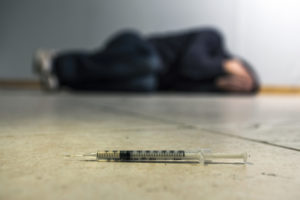What is Drug Dependence?
The abuse of drugs often leads to a variety of physical, mental, social and legal consequences. Within time, after prolonged use, drug abuse can eventually develop into addiction. Drug addiction is a potentially deadly physiological and psychological disorder that takes more than willpower alone to overcome. Professional drug addiction treatment is almost always needed in order to combat this destructive disease.
Drug addiction occurs when a person becomes physically dependent on a particular substance. A physical dependence can lead to extremely unpleasant symptoms of withdrawal when use of the drug is stopped. Despite the negative consequences associated with drug addiction and abuse, addicts will continue to excessively crave and seek out their drug of choice, simply to prevent potential withdrawal symptoms.
What are the Most Addictive Drugs?
Drug abuse comes in many different forms. An addiction can establish itself quickly, or after long-term use, depending on the drug in question. Once a drug addiction has developed, professional care and quality treatment will be needed. Drugs that have a high potential to cause an addiction, include:
- Opioids: Heroin, Fentanyl, OxyContin, Morphine, Vicodin, and Methadone among many others
- Sedatives: Benzodiazepines (Klonopin, Xanax, Valium, Ativan) and Barbiturates
- Stimulants: Cocaine, Crystal Meth, Adderall, and Ritalin
How does Drug Addiction Impact the Brain?
 Drug addiction bears many similarities to behavioral addictions. In fact, for many addicts, drug and behavioral addictions go hand-in-hand due to similar underlying neurological interactions. Research has shown that common secondary addictions, or behavioral addictions, often seen in those who enter addiction treatment include gambling addiction, eating disorders, and internet addiction.
Drug addiction bears many similarities to behavioral addictions. In fact, for many addicts, drug and behavioral addictions go hand-in-hand due to similar underlying neurological interactions. Research has shown that common secondary addictions, or behavioral addictions, often seen in those who enter addiction treatment include gambling addiction, eating disorders, and internet addiction.
Addiction is essentially a biochemical process, heavily centered on the neurological pathways in the brain that respond to pleasure, namely the dopamine, opioid, and serotonin systems. When these pathways are stimulated by the use of an addictive substance, the drug-seeking behavior is reinforced.
The brain’s prefrontal cortex has likewise been implicated in the development and progression of drug addiction. The prefrontal cortex is involved in the regulation of the brain’s reward centers, behavioral response inhibition, and a process known as salience attribution. Salience attribution determines the level of importance attributed to a particular activity, such as using a specific substance.
Psychologically, addicts are often in a profound state of denial regarding the impact that their drug use is having on themselves, as well as on the lives of the people around them. This denial can cause drug cravings to spiral into self-destructive behaviors and generally cannot be broken without professional help. Strong psychological defenses are often built up against feelings of anxiety, which would otherwise result from addictive behaviors.
What are Common Treatments for Drug Addiction?
Once an addict is able to accept that they have a problem, either by reaching this conclusion themselves or with the help of friends and family, they must then consider the options for treatment. At Restore Drug Rehab LA, drug addiction treatment is carried out by mental health professionals who use motivational techniques to help clients take responsibility for their own addiction and recovery.
The most common psychosocial therapy that psychologists and psychiatrists use in addiction treatment, is cognitive behavioral therapy (CBT). CBT is a straightforward and useful strategy for the treatment of addiction. By highlighting troublesome thoughts and behaviors, CBT allows clients to develop positive coping mechanisms for a lasting recovery.
The attending physicians and psychiatrists at Restore Drug Treatment LA, also have pharmacological therapies at their disposal. Over-the-counter medications and supplemental therapies are used to alleviate withdrawal symptoms, thereby making relapse less likely. In the case of opioid withdrawal, these methods provide sustainability and maintenance to prevent relapse over the long-term .
.
For many clients of Restore Drug Rehab LA, drug addiction treatment often begins with the process of detoxification. During a detox program, our team of specialists and clinical staff supervise patients to ensure a safe withdrawal from the drug of abuse. Our facility provides the much-needed support network and guidance that many people seeking recovery require while working towards sustained abstinence.
While residential rehab programs are recommended for most people seeking recovery, those with more mild addictions can benefit from our intensive outpatient treatment program. Outpatient services involve visiting our facility three to five times each week for one-on-one counseling and group therapy programs. Clients who complete addiction treatment in residential rehab often transition into an outpatient program as a form of aftercare support and relapse prevention while in the next phase of their recovery journey.
How to Choose the Appropriate Level of Care
Whether you will benefit more from a drug rehab program that takes place in a residential treatment setting or in outpatient rehab will depend on your individual needs and severity of addiction. Most people who seek treatment for a drug dependency find residential rehab programs substantially profitable because there is more structure, supervision, interaction, and active engagement in therapeutic healing. Residential rehab is known to significantly enhance the course of treatment and the reduce the risk of complications, such as relapse due to cravings and triggers to use. Clients are monitored during their stay in the residential facility at Restore Treatment LA and have access to support and guidance from the clinical staff 24 hours a day, seven days a week.
There is no one-size-fits-all solution for treating drug addiction. At Restore Drug Rehab LA, we have quality addiction treatment programs available to assist you in your recovery. We are dedicated to ensuring that every person who seeks to undergo addiction recovery at our facility, has access to the proper therapies and levels of care that best suits his or her unique needs. Do not let your drug addiction go untreated.
Don't wait any longer!
Insurance can cover up to 100% of treatment
We Accept Most Major Insurance Companies. We accept other forms of payment to make treatment affordable for yourself or a loved one












